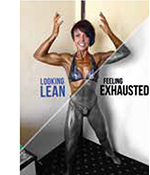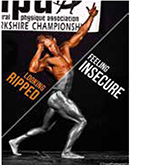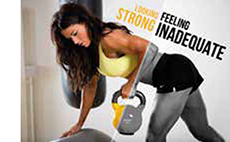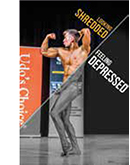Posted on 28 Jun 19
Written by Phill Wright, P13 Athlete
Having worked in the fitness industry now for the best part of 13 years, you’d imagine that I’d embrace working in fitness and fully feel like a part of it but in reality, this couldn’t be further from the truth.
On one hand, I’m passionate about health/fitness and helping people to enjoy the benefits of an active and healthy lifestyle but on another hand, I feel absolute despair towards the messaging of how our industry represents itself and portrays what health and fitness actually is.
How gyms promote the look of fitness, how personal trainers promote themselves. It feels like it’s become a soul-less and dishonest sector that constantly undermines any attempts to reach and help more people and ultimately be taken more seriously. In simple terms, we use unsustainable, barely obtainable and extreme images of people to model the ideal of what health and fitness looks like.
Firstly, health and fitness is more than just an appearance and it’s essential that we as an industry acknowledge this and more importantly, take full responsibility for educating people with the messaging we use, the priority we place on image, the way we set personal goals with people and ultimately create expectations. If not, we will continue to let people down and do ourselves no favours in driving our sector forward. Fitness is more than just a set of physical metrics but a feeling of being in control and a confidence of believing in your own habits.
Surely, the ideal approach as a fitness professional is to help encourage people towards a state of self-acceptance, confidence and nurturing a good long term relationship with both exercise and nutrition whereby they can enjoy all the benefits. And if we’re unable to do this effectively then perhaps we should be putting our hands in the air and clearly stating our own limitations whilst looking for ways of being better skilled until we’re able to do so.
Yet, this doesn’t seem to be happening. Rather than acknowledging our own shortcomings, we focus on the quick wins by exploiting the greatest vulnerabilities that people have. As an example, whilst the recommended guidelines that we work to for health suggest certain ranges for body composition including muscle and fat, the people in the photos that we use are generally not in those healthy ranges and generally under-fat and over-lean so how we can be surprised that being healthy almost isn’t enough?!
People are largely self-conscious with their appearance. Whilst I’d like to say I’m confident with myself, if you put me on a beach with a load of professional athletes, I’d likely be feeling pretty self conscious and I’m pretty certain I wouldn’t be alone yet actually, experience tells me that, many of the professional athletes would also be lacking in confidence in their own skin.
Sounds crazy but it’s true and I think part of the reason for this epidemic of poor self acceptance is that we’ve somehow ended up in a place where society (even the people in the glossy marketing pictures) feels like the sole measure of our state of health is in this almost unobtainable appearance used in marketing that we’re subjected to numerous times on a daily basis. Furthermore, there also seems to be a widely accepted belief that being in the kind of shape that society projects as the ideal of health and fitness is the key to happiness and self contentment. My thoughts differ significantly!
And to explore my thoughts a little more, I approached a number of friends who’ve done fitness modelling in the past to get a little insight into how they felt when they were in the ‘shape of their life’, what sacrifices were made and how striving to achieve a certain look served them in the longer term. Thank you so so much for sharing your experiences.
Ali Winter
 “I couldn’t socialise as there was too much temptation with food and drink. I missed out on family gatherings and if I did go anywhere I ALWAYS had 2 meals with me in my ‘tupperware’. Mentally it didn’t serve me well as after the competitions had finished and I was back up to a decent level of body fat (20%) (I had dropped to 12% as per my tanita scales) I thought I was obese and hated myself. I confined to weigh out all my food and was obsessed by counting macros. I ended up that unwell that I didn’t see what the point to life was and was under the care of a psychiatrist who diagnosed me with “disordered eating and body dysmorphia”.
“I couldn’t socialise as there was too much temptation with food and drink. I missed out on family gatherings and if I did go anywhere I ALWAYS had 2 meals with me in my ‘tupperware’. Mentally it didn’t serve me well as after the competitions had finished and I was back up to a decent level of body fat (20%) (I had dropped to 12% as per my tanita scales) I thought I was obese and hated myself. I confined to weigh out all my food and was obsessed by counting macros. I ended up that unwell that I didn’t see what the point to life was and was under the care of a psychiatrist who diagnosed me with “disordered eating and body dysmorphia”.
"Now, 5 years on whilst I’d love to be a little leaner and know I can be, I would only really do this by increasing my exercise and doing more conditioning than rather than restricting my food too much. I have a sweet tooth and chocolate is always on the agenda.
"From a professional perspective, if a potential client asked me to get them competition-ready or ultra lean I simply wouldn’t train them. There’s no balance to life when you’re in prep for competition, those 17 weeks of “dieting” (a word I absolutely hate in that context now) I did, had serious health consequences and I wouldn’t put myself or anyone through them again.”

Chris Kershaw
“I had to sacrifice socialising, probably some friendships and mostly my sanity. When I was at a very low body fat with the pressure of competition, I found it impossible to stay sane which resulted in a short-term binge eating disorder. In terms of it being an aesthetic goal, this didn't really affect me. I just wanted to do well in my eyes. My first competition was one of the best days of my life for many reasons. Without that prep I wouldn't be the person I am today. It taught me a great deal and made me stronger. I think everyone should get lean at least once to feel and know what it takes.”
 Tracey Dougan
Tracey Dougan
“On this shoot I felt so disgustingly bloated and fat! Because the day prior I had competed (in bodybuilding) so I gorged so badly on all sorts of crappy food that people had given me for making it through to the finals. I felt fat, awful and no good enough.”
Lewis Samardzija
 “The main sacrifice I made was certainly my social life! I missed 2 holidays with my friends and many birthdays and nights out. Although looking back now I could have maybe managed that better. In regards to health, 10 weeks in I lost my libido for 6 months. I think that this is not often discussed enough around natural athletes as it occurs very commonly.
“The main sacrifice I made was certainly my social life! I missed 2 holidays with my friends and many birthdays and nights out. Although looking back now I could have maybe managed that better. In regards to health, 10 weeks in I lost my libido for 6 months. I think that this is not often discussed enough around natural athletes as it occurs very commonly.
"Binge eating 1-2 x per week from an emotional eating stand point where I would come home eat everything in the house bread, cereal until the point of almost vomiting and then the next day train for 3+ hours and get in saunas to try lose the gained weight.”
It’s astonishing really that on one hand, we’re all chasing this ideal appearance and yet the very people in the pictures are pushing themselves to the absolute limits and feel anything but ideal. So, rather than just rant and state what I consider to be the problems, I felt it only right to offer some suggestions on how you can avoid being pulled in by the smoke and mirrors of the industry that’s got your back when it comes to health and fitness:
1. Firstly, when looking at glossy pictures of fitness models. Accept that you have no idea how that person felt at the time of the photo shoot, you know nothing about the sacrifices they had to make and whether or not they could sustain that appearance.
2. Try to avoid setting personal goals that are exclusively image related. There is no real measure beyond opinion that can determine whether or not you’ve achieved your goal and in my experience, image-related goals can lead people towards a cycle of destructive obsession and distort what is truly important.
3. Whatever you do and whatever goals you set, consider the impact on yourself and the people who are important to you, the time and sacrifice it will take and prioritise enjoyment.
Secondly, some pointers for us as the people working within the industry:
1. When posting glossy images of fitness models, do so with honesty and integrity in a way that helps the viewer appreciate the truth behind what it takes to look that way. Protect the integrity of your messaging by exclusively using fitness models who reflect the healthy ranges for body composition.
2. I also believe we need to separate out aspects of our industry including body building, crossfit and even many sports. In my mind, these can be extreme disciplines that demand unhealthy parameters and as such do not belong in the health and fitness industry. Each is a vehicle that can lead people to improvements in health and fitness but it’s important that we educate people better to make more informed decisions around the goals they set and paths they follow. I have a lot of respect for the levels of discipline that people demonstrate when preparing for competitions or a shoot but I do feel that without greater understanding and support, each can have significantly detrimental long term effects on health both in mind and body.
3. Don’t put so much pressure on yourself as a fitness professional to be perceived as the ultimate role model or be in the most incredible shape ever (whatever that means). Just be yourself and know that people will connect far greater with you when you’re true to yourself as opposed to trying to become a fitness robot. Be authentic, honest, open and well, human. Most people don’t (and shouldn’t feel like they need to) spend hours in the gym every day to achieve their goals - presenting this requirement creates a lot of pressure on you, creates an unrealistic ideal and shuts you off from the very people you aim to help.
As a dad of 2 amazing girls (currently 7 and 3), I see such an incredible body confidence in them that helps them
take on everything confidently and I’d love nothing more than them both keeping this for life. I’d love your thoughts on this topic. Whether you’ve got a goal that you’re working towards, you’re struggling to
gain motivation or you’re working in the industry, this is such a huge topic that impacts us all.
Phill Wright, P13 Athlete